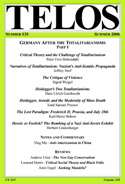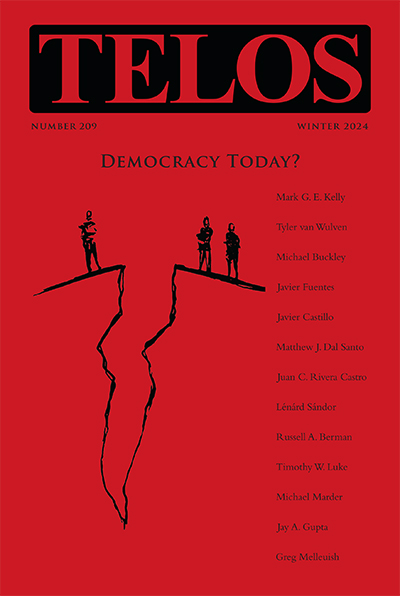By Russell A. Berman · Tuesday, September 5, 2006 Despite the approaching mid-term elections and the criticism of the Bush administration’s conduct of foreign policy, the left—domestically and internationally—has had a hard time in articulating an alternative positive vision. “Not Bush” only gets you so far: sooner or later a substantive alternative is needed to give opposition credibility. Facing turmoil (to say the least) in the Arab and Islamic world, what foreign policy would be preferable? Evidence demonstrates that neither “UN” nor “EU” is a believable response. But the problem is deeper than the pragmatics of current diplomacy.
The left (and liberal) imagination would prefer to cast the confrontation with Islamic extremism or, yes, Islamic fascism, as a matter of imperialism and “anti-imperialism.” The terminology constitutes a treasured legacy of the left, not only from Lenin’s account of imperialism and capitalism (which then permitted him and his successors to mask Soviet Russian expansionism as somehow “anti-imperialist”) but also from a more honorable resistance in the US and Europe to imperial expansion of the late nineteenth century.
In the meantime, anti-imperialism is today’s last hurrah of the traditional left. Having given up nearly all of its other principles, especially in the phase of multiculturalism and post-modernism, it drapes itself in the anti-imperialist flag as a way to remember its glory days. Hence the grotesque sight of the (extreme) left celebrating the reactionary forces of Hezbollah (ask about the role of women or the status of free unions).
The problem however is that the theory of anti-imperialism—probably insufficient already a century ago—is simply irrelevant today. Exactly which natural resources are being fought for in Afghanistan, that fabled land of plenty? Which advanced capitalist company really needs to export its “surplus capital” to the Sunni triangle? And which is the national liberation movement that leads Sunni to kill Shi’a in Pakistan?
None of these conceptualizations of empire and anti-imperialism is adequate to the current situation, which is very explicitly being driven by something else: either an ideological-religious fanaticism or, on a deeper cultural level, a desire for death. Let us consider the account most recently televised by our compatriot and now Al-Qaeda operative Adam Gadahn, otherwise known affectionately as “Azzam the American.” Gadahn, who has been sought by the FBI for several years aired an address on tajed.net on September 2. In it he articulates aspects of the Islamic-fascist critique of the West and, as has been widely reported, called for conversion to Islam. . . .
Continue reading →
By Russell A. Berman · Friday, September 1, 2006 Of course, it was Imperial Japan, not Nazi Germany, that attacked Hawaii. Yet in the immediate aftermath of the day of infamy, the United States entered a war both in Europe and in the Pacific. Although the political structures and ideologies of Japan and Germany were hardly identical and their geopolitical ambitions were not at all thoroughly aligned (who would replace the British in India?), President Roosevelt was able to articulate a clear opposition between the democracies and the fascist powers. Differences among the various fascist regimes could still leave room for nuanced policies and strategic decisions: there was no allied invasion of Franco’s Spain. Yet the fact that Mussolini was not Hitler did not prohibit the invasion of Sicily, a crucial link in the chain that would lead to victory in both theaters.
Such was the ability of American society then and its political leadership to resist and defeat the dictatorships of the Second World War, followed decades later by the successful conclusion of the Cold War with the collapse of the Soviet Union. That capacity for such political and military resolve is however of a completely different nature than academic inquiry which, characteristically, has developed a rich insight into the specific features and differences among the dictatorships. Scholars distinguish and differentiate, and this variegated knowledge can, at times, inform policy decisions, but, in the end, academics have the professional luxury of never having to act and certainly not to take action to contribute to national security.
Some intellectuals nonetheless have the ability to see the big picture. Arendt’s Origins of Totalitarianism of 1951 draws primarily on the examples of Nazi Germany and Stalinist Russia, between which she describes important similarities. Aside from the left, which has always resented the impugning of Communism, academic objections to Arendt’s study have pointed out the undeniable differences between Hitler and Stalin, and their respective regimes. Within scholarly research, such criticisms should not be discounted, but there is a point, particularly when one moves from the university into the political arena, where this quibbling becomes a debilitating fixation: insistence on the specificity of each tree, while refusing to take note of the forest.
This is a problem with categories as such. Individual phenomena retain an irreducible particularity, which makes up the texture of lived life, the Lebenswelt; at the same time, we cannot do without a conceptual vocabulary to describe commonalities and to enable action in the world. Action is a defining condition of humanity, the ability to build on reflection to transform the world through creative innovation. Without the conceptual tools of thought, action becomes blind; but without an active pursuit of human goals—telos—thought diminishes.
Continue reading →
By Russell A. Berman · Thursday, August 31, 2006 Ramin Jahanbegloo, a leading proponent of Iranian democratization, has just been released from several months of incarceration in Teheran. Active in building bridges to Western intellectuals (including dialogues with Isaiah Berlin and George Steiner), Jahanbegloo—also a Canadian citizen—was arrested in April of this year at the Teheran airport on his way to a conference in Europe. Accusations included spying and efforts to pursue a US-inspired “Velvet Revolution” in Iran. Other accounts suggest that an interview he gave with a Spanish newspaper, critical of Ahmadenijad’s Holocaust denial, led to his arrest.
The release may represent an effort to pursue a minor distraction from the crisis over Iran’s nuclear technology. There is certainly no indication of a larger thaw. There may be some more complex ideological and tactical connection, discussed below. This is however an important opportunity to pursue the connections between “theory,” which is clearly Jahanbegloo’s passion, and the urgent political questions of the moment.
In his essay “Iranian Intellectuals: from Revolution to Dissent,” Jahanbegloo distinguishes between reformist/revolutionary and conservative forces. Note the intellectual genealogy of the conservatives of the Mullahocracy.
“Unlike the reformist intellectuals, the neo- conservative intellectuals in Iran are in favor of the supremacy of the Leader and against concepts such as democracy, civil society and pluralism. This movement includes figures such as Reza Davari Ardakani, Javad Larijani and Mehdi Golshani. The famous personality among these is Reza Davari Ardakani, who as an anti- Western philosopher is very familiar with the works of Martin Heidegger. Davari, unlike Soroosh, takes some of the features of Heidegger’s thought, mainly the critic of modernity and puts it into an Islamic wording. He rejects the Western model of democracy, which is based on the separation of politics and religion.”
Heidegger in Teheran as an account of anti-modernism? But beyond the dialectic of left and right from the generation of the Iranian revolution, Jahanbegloo describes a younger generation which approaches modernity from what appears to be a post-modern perspective: not post-modern in the sense of giddy relativism or irresponsibility but with liberal openness and an interest in dialogue.
Continue reading →
By Russell A. Berman · Wednesday, June 7, 2006 Telos 135: Germany after the Totalitarianisms, Part I is available for purchase in our store.
 With the collapse of the Soviet Union and the end of the Cold War, a widespread rethinking of political history and social theory commenced. Questions long frozen in the glacial stand-off between East and West began to thaw out, and the ideological mythologies of the twentieth century were subjected to new scrutiny. Why had the century of modernity been so centrally catastrophic? What was the nature of the worst offenders, the totalitarian regimes—especially in Germany, Italy, and Russia—that had generated so much violence? How could intellectuals and public opinion alike have facilely regarded Nazi Germany and fascist Italy as nearly identical formations (when they displayed so many differences)? And how could Stalinist Russia have been hailed as a positive alternative to Nazi Germany (when they displayed so many similarities)? With the disappearance of the Soviet Union, these interrogations could be pursued without the agenda, baggage, and defensiveness of the previous historical era. The question of the totalitarian state could finally be posed with the advantage of historical distance.. With the collapse of the Soviet Union and the end of the Cold War, a widespread rethinking of political history and social theory commenced. Questions long frozen in the glacial stand-off between East and West began to thaw out, and the ideological mythologies of the twentieth century were subjected to new scrutiny. Why had the century of modernity been so centrally catastrophic? What was the nature of the worst offenders, the totalitarian regimes—especially in Germany, Italy, and Russia—that had generated so much violence? How could intellectuals and public opinion alike have facilely regarded Nazi Germany and fascist Italy as nearly identical formations (when they displayed so many differences)? And how could Stalinist Russia have been hailed as a positive alternative to Nazi Germany (when they displayed so many similarities)? With the disappearance of the Soviet Union, these interrogations could be pursued without the agenda, baggage, and defensiveness of the previous historical era. The question of the totalitarian state could finally be posed with the advantage of historical distance..
Continue reading →
|
|
 With the collapse of the Soviet Union and the end of the Cold War, a widespread rethinking of political history and social theory commenced. Questions long frozen in the glacial stand-off between East and West began to thaw out, and the ideological mythologies of the twentieth century were subjected to new scrutiny. Why had the century of modernity been so centrally catastrophic? What was the nature of the worst offenders, the totalitarian regimes—especially in Germany, Italy, and Russia—that had generated so much violence? How could intellectuals and public opinion alike have facilely regarded Nazi Germany and fascist Italy as nearly identical formations (when they displayed so many differences)? And how could Stalinist Russia have been hailed as a positive alternative to Nazi Germany (when they displayed so many similarities)? With the disappearance of the Soviet Union, these interrogations could be pursued without the agenda, baggage, and defensiveness of the previous historical era. The question of the totalitarian state could finally be posed with the advantage of historical distance..
With the collapse of the Soviet Union and the end of the Cold War, a widespread rethinking of political history and social theory commenced. Questions long frozen in the glacial stand-off between East and West began to thaw out, and the ideological mythologies of the twentieth century were subjected to new scrutiny. Why had the century of modernity been so centrally catastrophic? What was the nature of the worst offenders, the totalitarian regimes—especially in Germany, Italy, and Russia—that had generated so much violence? How could intellectuals and public opinion alike have facilely regarded Nazi Germany and fascist Italy as nearly identical formations (when they displayed so many differences)? And how could Stalinist Russia have been hailed as a positive alternative to Nazi Germany (when they displayed so many similarities)? With the disappearance of the Soviet Union, these interrogations could be pursued without the agenda, baggage, and defensiveness of the previous historical era. The question of the totalitarian state could finally be posed with the advantage of historical distance..

